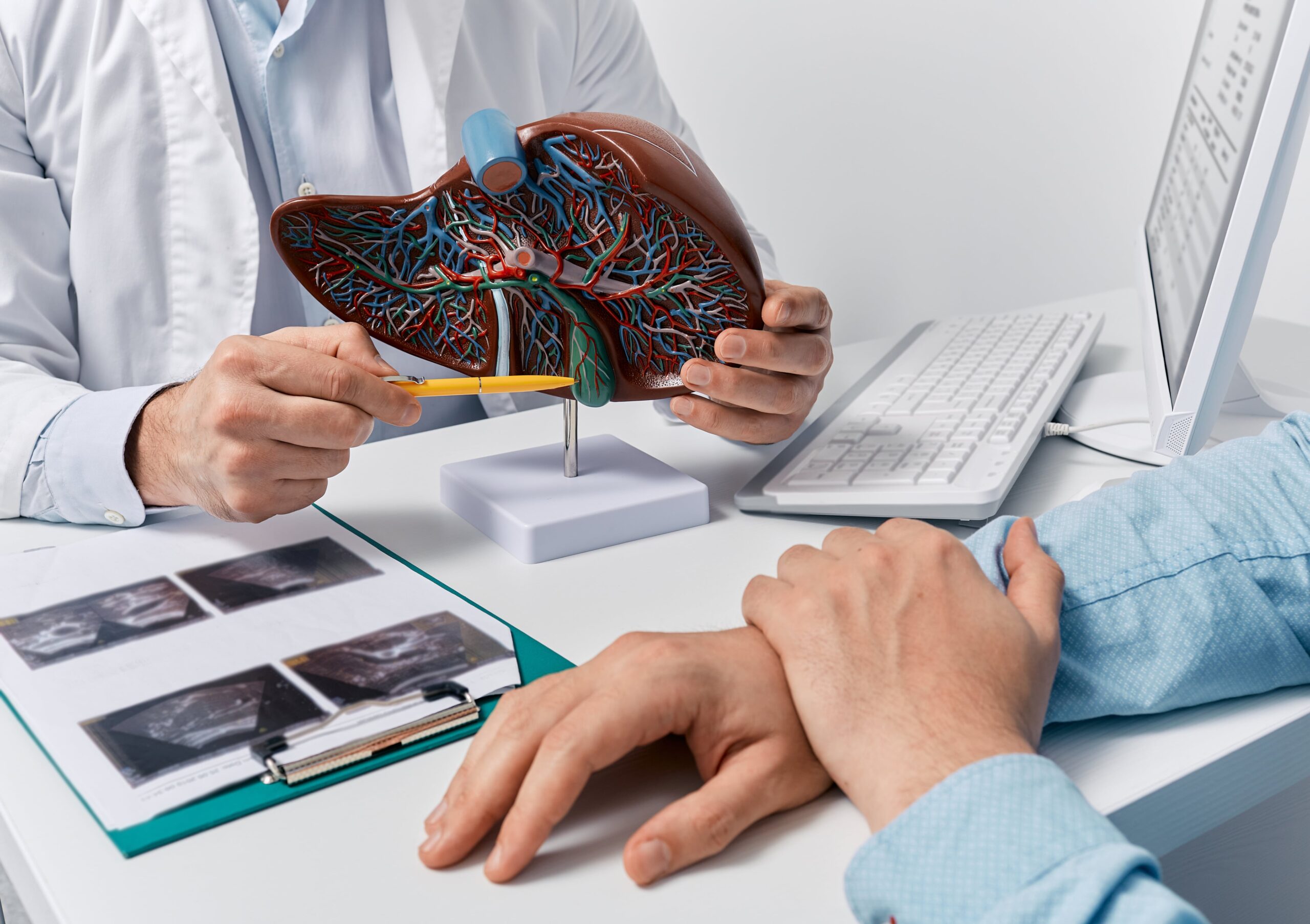Alcoholism is a serious and often devastating addiction that can have long-term consequences on the body. Chronic alcohol consumption can lead to hepatitis, cirrhosis, and liver disease.
Finding out how alcoholism and the liver are affected and the different types of liver damage that can result from alcoholism can help people seek help when addicted to alcohol and prevent further damage to the liver.
Alcohol and the Liver
Alcohol and the liver are closely intertwined, as excessive alcohol consumption can significantly damage this vital organ. The relationship between alcohol and the liver becomes particularly concerning because most people do not show symptoms of liver damage until significant harm has already been done.
When alcohol is consumed, it is processed by the liver to be metabolized and broken down. However, chronic and heavy drinking overloads the liver, leading to inflammation, fatty deposits in the liver cells (steatosis), hepatitis (inflammation of the liver), cirrhosis (scarring of the liver tissue), and even liver failure.
Defining Alcohol Hepatitis
Alcohol hepatitis is a condition characterized by liver inflammation that occurs from excessive alcohol consumption.
This inflammation can range from mild to severe and can cause symptoms such as abdominal pain, jaundice, nausea, vomiting, fatigue, and weight loss. If left untreated, alcohol hepatitis can progress to more serious liver problems like cirrhosis or liver failure.
What Is Cirrhosis?
Cirrhosis of the liver occurs from many types of liver diseases, including alcoholism, alcohol abuse, and alcohol use disorder. It is clinically known as fibrosis of the liver, which is scarring of liver tissues.
Each time the liver is inflamed, it tries to repair itself. In the process, scar tissue forms. As cirrhosis progresses, more and more scar tissue forms, making it difficult for the liver to function properly.
Signs of Cirrhosis
Some common signs and symptoms of cirrhosis include:
- Fatigue and weakness
- Loss of appetite
- Nausea and vomiting
- Weight loss
- Abdominal pain or discomfort in the upper right side
- Jaundice (yellowing of the skin and eyes)
- Swelling in the legs, ankles, or abdomen
- Itchy skin
- Easy bruising or bleeding
It’s important to note that some individuals with cirrhosis may not experience any symptoms until later stages when significant liver damage has already occurred.
The Effects of Liver Failure from Alcoholism
Liver failure from alcoholism can have serious and potentially life-threatening effects on the body. As the liver loses its ability to function properly, several complications can arise.
Portal hypertension could occur, which is an increase in blood pressure in the portal vein that carries blood to the liver. This leads to complications such as fluid buildup in the abdomen, enlarged veins in the esophagus or stomach, and hepatic encephalopathy (brain dysfunction due to liver failure).
Chronic alcohol use is a significant risk factor for developing liver cancer. Liver failure can lead to kidney problems and impairment in functioning. A compromised liver may struggle to metabolize nutrients effectively, leading to malnutrition and vitamin and mineral deficiencies.
Additionally, clotting factor production can be impaired by liver damage, resulting in increased bleeding tendencies. In severe cases, a liver transplant may be necessary as a life-saving treatment option.
Signs of Alcoholic Liver Failure
Some signs and symptoms of alcoholic liver failure include:
- Jaundice
- Fluid buildup in the abdomen
- Mental confusion or changes in behavior
- Easily bruises or bleeds
- Fatigue
- Weakness
- A general feeling of being ill
- Loss of appetite
- Nausea and vomiting
- Abdominal pain or discomfort
It is important to seek medical attention immediately if any of these symptoms are present, as alcoholic liver failure can be life-threatening when left untreated.
Are Liver Failure and Cirrhosis Reversible?
In the early stages of liver disease, with lifestyle changes like stopping alcohol consumption, following a healthy diet, maintaining a healthy weight, and regular exercise, liver damage can be potentially reversed.
However, once cirrhosis has developed, it is typically not reversible. Once cirrhosis progresses to end-stage liver failure, where the liver can no longer function adequately enough on its own, a transplant is necessary.
Treatment for Alcoholism and the Liver
Treatment for alcoholism and the liver usually involves a multi-faceted approach, including:
- Alcohol detox and rehab: The most critical step in treating alcoholism and liver disease is to stop drinking alcohol completely.
- Medication-assisted treatment (MAT): Medications may be prescribed to manage withdrawal symptoms, assist with maintaining sobriety, or address specific conditions.
- Nutritional counseling: Malnutrition is common in individuals with alcoholic liver disease. So, learning how to eat healthy and making dietary changes is necessary.
- Counseling and therapy: Either individual, group, or family therapy.
- Regular monitoring: Regular follow-up visits with healthcare providers are essential to monitor liver function, assess progress, and adjust treatment plans as needed.
Behavioral therapies, counseling, and support groups help individuals overcome alcohol addiction and maintain sobriety.
Reducing Liver Damage and Hepatitis Caused by Alcoholism
Reducing liver damage and hepatitis caused by alcoholism involves taking steps to eliminate alcohol consumption, maintaining a healthy lifestyle, and seeking medical treatment as needed.
For individuals with end-stage liver failure or advanced cirrhosis, the average survival rate without a liver transplant is typically low. However, a liver transplant can significantly improve life expectancy and quality of life for those who qualify and receive the procedure.
Get Detox to Reduce Risks of Liver Disease in Pompano Beach, FL
Take the first step to a brighter future and healthier liver with alcohol detox in beautiful Pompano Beach, FL, at Retreat of Broward. Our compassionate and caring team offers comprehensive and personalized care to help you achieve a life free from alcoholism and liver disease.
Contact us today to start your recovery journey.






